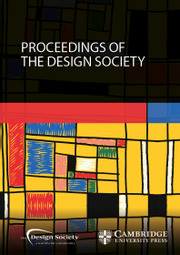No CrossRef data available.
Article contents
CONSTRUCTION OF THE MAPPING OF CORPORATE SOCIAL RESPONSIBILITY ISSUES THAT CAN BE MANAGED DURING THE DESIGN PROCESS - APPLICATION IN THE AUTOMOTIVE INDUSTRY
Published online by Cambridge University Press: 27 July 2021
Abstract
Sustainability is a key issue for manufacturing companies, which detail in their annual corporate social responsibility (CSR) reports how they plan to operationalise the seventeen sustainable development goals set by the United Nations in 2016. Design is deemed particularly relevant to integrate sustainability issues, and many design for sustainability (DFS) approaches have developed since the 1980s. However, the lack of understanding of the relationship between CSR and design prevents DFS approaches from enabling sustainability issues to be integrated in the design process in a relevant manner with the CSR strategy of a company. Consequently, we developed a mapping methodology in order to provide a better understanding of the CSR-design relationship. This mapping methodology consists in (1) identifying the relevant CSR goals that can be managed during the design process, (2) gathering information about the links between these CSR goals and the design process through semi-structured interviews, and (3) building a map representing these links. We started to apply our mapping methodology in an application case in the automotive industry. The first results of this application are presented in this article.
- Type
- Article
- Information
- Creative Commons
- This is an Open Access article, distributed under the terms of the Creative Commons Attribution-NonCommercial-NoDerivatives licence (http://creativecommons.org/licenses/by-nc-nd/4.0/), which permits non-commercial re-use, distribution, and reproduction in any medium, provided the original work is unaltered and is properly cited. The written permission of Cambridge University Press must be obtained for commercial re-use or in order to create a derivative work.
- Copyright
- The Author(s), 2021. Published by Cambridge University Press




